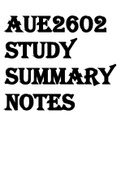Summary
AUE2602 STUDY SUMMARY NOTES 2022.
- Institution
- University Of South Africa
AUE2602 STUDY SUMMARY NOTES 2022. This document contains an all-inclusive and a complete guide to AUE2602 - Corporate Governance In Accountancy Assertions are categorized as follows: • assertions about classes of transactions and events for period under audit e.g. sales, interest received •...
[Show more]



